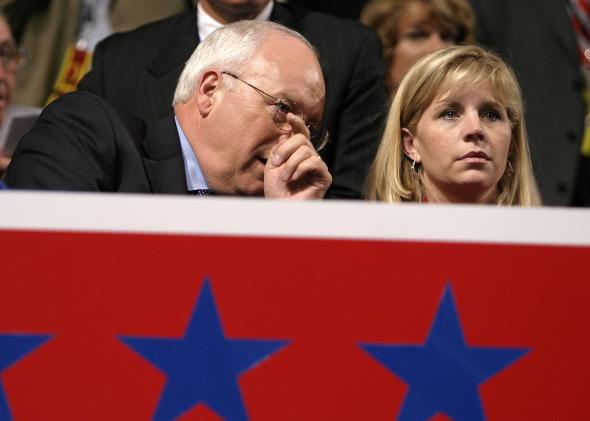Just a few years ago, gay-bashing was a central tenet of conservatism. In 2004, President George W. Bush bought himself four more years in office by helping to plant anti-gay amendments on 11 state ballots. Three of the four Republican state senators who broke ranks and voted for New York’s gay marriage bill in 2011 got booted out of office by conservative primary challengers. And President Barack Obama was so terrified of anti-gay sentiment that he waited until late in his first term to cautiously endorse marriage equality.
But when the news broke Sunday evening that Liz Cheney was quitting her cowardly and hubristic Wyoming Senate campaign, it seemed to signal a subtle shift in American politics. Cheney, you may recall, challenged Republican Mike Enzi to an ill-fated primary, claiming that Enzi lacked true conservative bona fides. (He doesn’t.) In response to pro-Enzi superPAC ad suggesting Cheney’s liberal slant on gay rights, the would-be senator partook in some good old-fashioned gay-bashing, declaring her opposition to same-sex marriage. The statement sparked an ugly feud within the Cheney family, given that Cheney’s own sister is a married lesbian with children.
But Cheney refused to back down, standing by her blatant bid to attract Wyoming’s more bigoted voters. And now she’s failed—in fact, she tanked so badly that she had to overcome her own arrogance and save herself the embarrassment of a total rout by dropping out.
It’s tempting to see the race as homophobe vs. homophobe; Enzi supporters did, after all, fire the first anti-gay shot. Yet Cheney lagged 40 points behind Enzi well before the pro-Enzi ad, and she only fell further after she came out swinging against gay marriage. The takeaway here is not necessarily that the era of anti-gay politicking is entirely over; as Windsor reaches into the states, conservative legislators will undoubtedly continue to score support by stoking homophobic animus. Instead, the undignified collapse of Cheney’s campaign suggests that, in 2014, a candidate cannot simply demonstrate hatred of gay people to pull in conservative votes. Aside from illustrating the depths of her bigotry by betraying her own sister, Cheney presented few coherent policies on the campaign trail. By dint of publicity—publicity she practically demanded—she became known as a hardline anti-gay candidate.
And that did absolutely nothing to narrow her humiliatingly low popularity, to boost her fundraising, or to garner conservative support. Liz Cheney betrayed her family for nothing more than a few scornful headlines, and now she’s giving up, leaving behind, as Dave Weigel put it, “nothing but a rich vein of liberal schadenfreude.” A candidate who was doomed from the start attempted to feed off homophobia—and found herself sinking even deeper in the muck. Perhaps the next homophobic candidate will think twice before repeating Cheney’s nasty, gratuitous charade.
